Entrepreneurship and Small Business Management: A Detailed Examination
VerifiedAdded on 2020/10/05
|19
|5250
|363
Report
AI Summary
This report provides a comprehensive overview of entrepreneurship and small business management. It begins by defining entrepreneurship and exploring various types of ventures, including small businesses, micro enterprises, startups, and large organizations, along with their characteristics and similarities/differences. The report then analyzes the impact of small and micro entrepreneurship on the economy, highlighting their role in job creation, innovation, and economic growth, particularly in the context of post-Brexit challenges. It also discusses the importance of small and startup businesses in social and economic growth. Furthermore, the report identifies the key characteristics, traits, and skills of successful entrepreneurs, assessing how entrepreneurial personality reflects motivation and mindset. Finally, it examines the environmental factors that either hinder or foster the growth of entrepreneurship. The report concludes by summarizing the key findings and implications for entrepreneurs and policymakers.

ENTREPRENEURSHIP AND SMALL
BUSINESS MANAGEMENT
BUSINESS MANAGEMENT
Paraphrase This Document
Need a fresh take? Get an instant paraphrase of this document with our AI Paraphraser
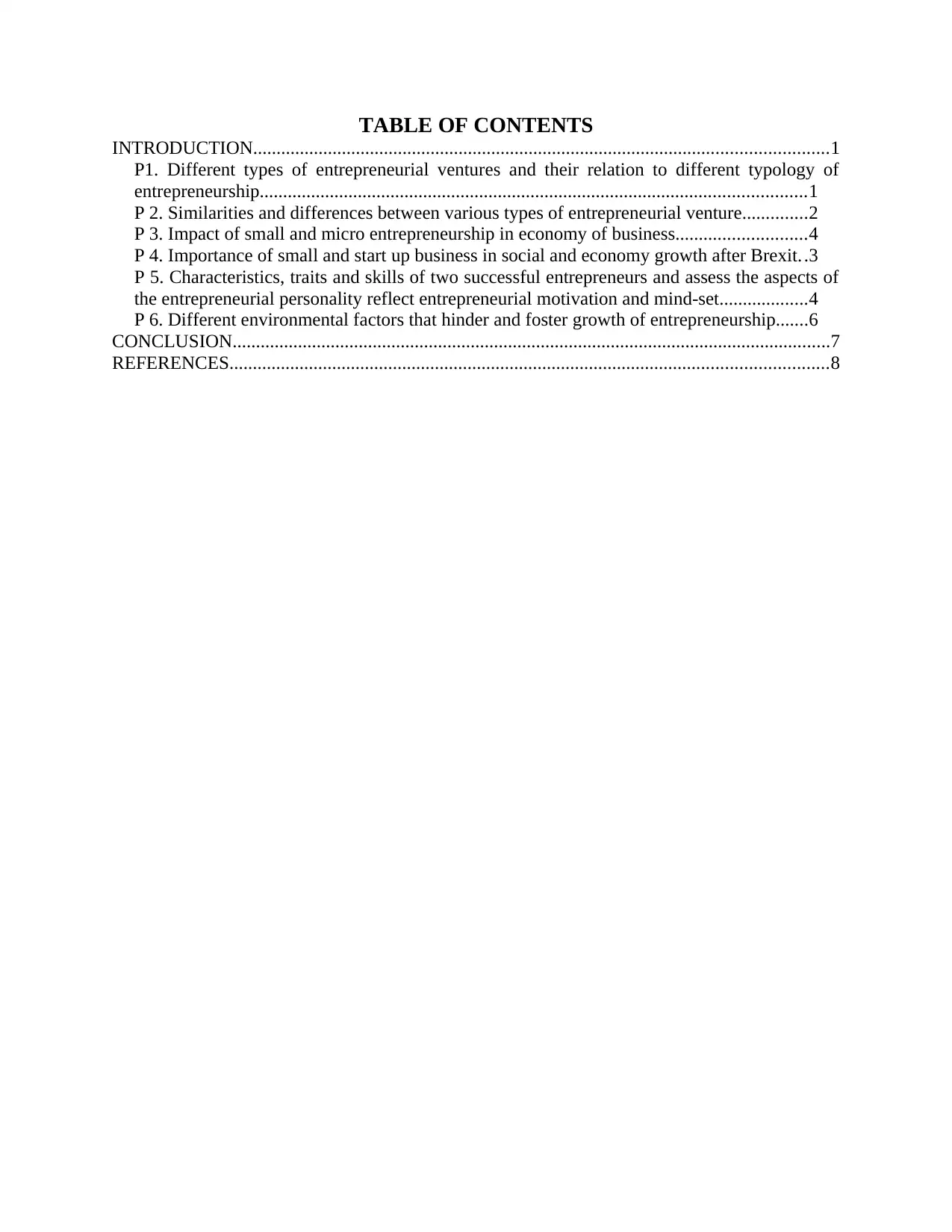
TABLE OF CONTENTS
INTRODUCTION...........................................................................................................................1
P1. Different types of entrepreneurial ventures and their relation to different typology of
entrepreneurship.....................................................................................................................1
P 2. Similarities and differences between various types of entrepreneurial venture..............2
P 3. Impact of small and micro entrepreneurship in economy of business............................4
P 4. Importance of small and start up business in social and economy growth after Brexit..3
P 5. Characteristics, traits and skills of two successful entrepreneurs and assess the aspects of
the entrepreneurial personality reflect entrepreneurial motivation and mind-set...................4
P 6. Different environmental factors that hinder and foster growth of entrepreneurship.......6
CONCLUSION................................................................................................................................7
REFERENCES................................................................................................................................8
INTRODUCTION...........................................................................................................................1
P1. Different types of entrepreneurial ventures and their relation to different typology of
entrepreneurship.....................................................................................................................1
P 2. Similarities and differences between various types of entrepreneurial venture..............2
P 3. Impact of small and micro entrepreneurship in economy of business............................4
P 4. Importance of small and start up business in social and economy growth after Brexit..3
P 5. Characteristics, traits and skills of two successful entrepreneurs and assess the aspects of
the entrepreneurial personality reflect entrepreneurial motivation and mind-set...................4
P 6. Different environmental factors that hinder and foster growth of entrepreneurship.......6
CONCLUSION................................................................................................................................7
REFERENCES................................................................................................................................8
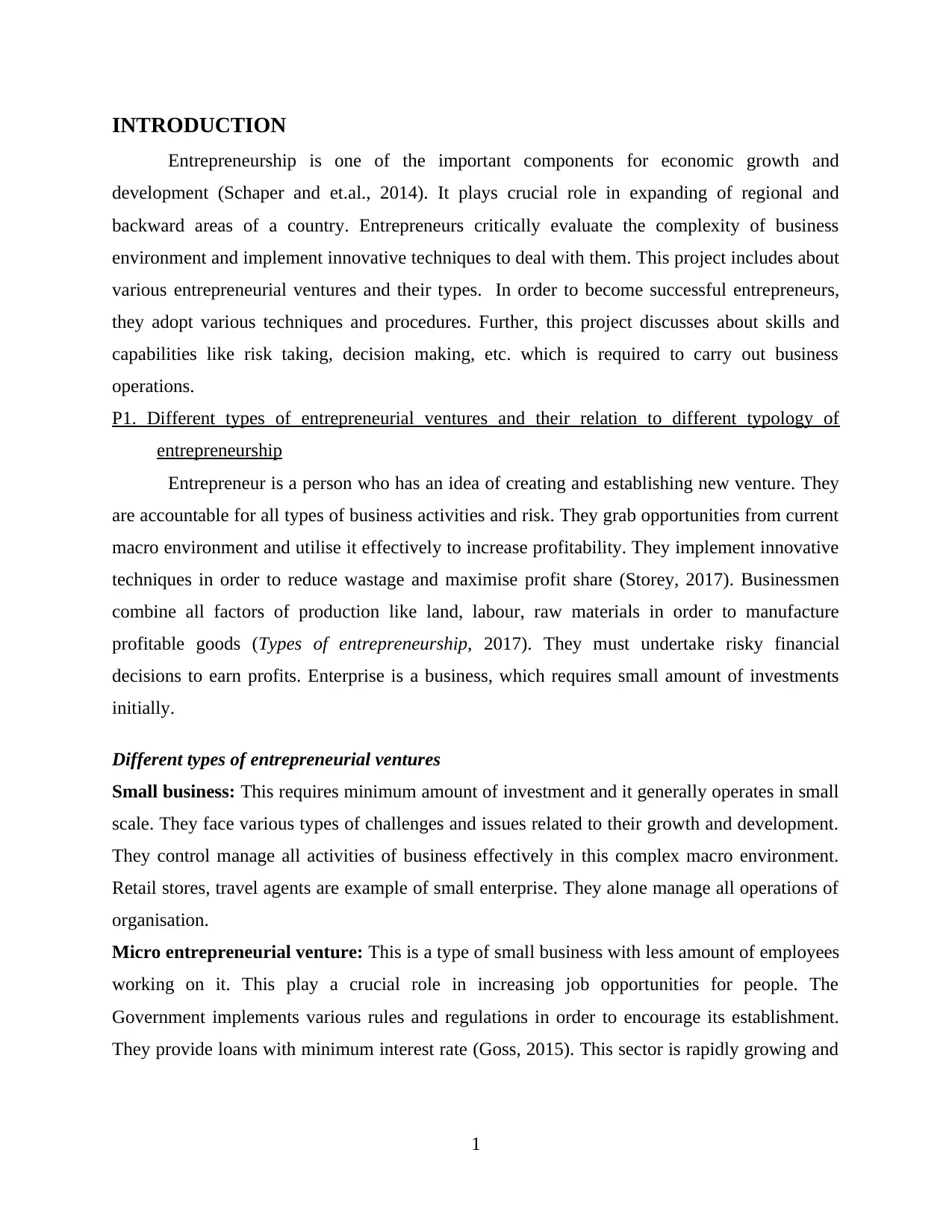
INTRODUCTION
Entrepreneurship is one of the important components for economic growth and
development (Schaper and et.al., 2014). It plays crucial role in expanding of regional and
backward areas of a country. Entrepreneurs critically evaluate the complexity of business
environment and implement innovative techniques to deal with them. This project includes about
various entrepreneurial ventures and their types. In order to become successful entrepreneurs,
they adopt various techniques and procedures. Further, this project discusses about skills and
capabilities like risk taking, decision making, etc. which is required to carry out business
operations.
P1. Different types of entrepreneurial ventures and their relation to different typology of
entrepreneurship
Entrepreneur is a person who has an idea of creating and establishing new venture. They
are accountable for all types of business activities and risk. They grab opportunities from current
macro environment and utilise it effectively to increase profitability. They implement innovative
techniques in order to reduce wastage and maximise profit share (Storey, 2017). Businessmen
combine all factors of production like land, labour, raw materials in order to manufacture
profitable goods (Types of entrepreneurship, 2017). They must undertake risky financial
decisions to earn profits. Enterprise is a business, which requires small amount of investments
initially.
Different types of entrepreneurial ventures
Small business: This requires minimum amount of investment and it generally operates in small
scale. They face various types of challenges and issues related to their growth and development.
They control manage all activities of business effectively in this complex macro environment.
Retail stores, travel agents are example of small enterprise. They alone manage all operations of
organisation.
Micro entrepreneurial venture: This is a type of small business with less amount of employees
working on it. This play a crucial role in increasing job opportunities for people. The
Government implements various rules and regulations in order to encourage its establishment.
They provide loans with minimum interest rate (Goss, 2015). This sector is rapidly growing and
1
Entrepreneurship is one of the important components for economic growth and
development (Schaper and et.al., 2014). It plays crucial role in expanding of regional and
backward areas of a country. Entrepreneurs critically evaluate the complexity of business
environment and implement innovative techniques to deal with them. This project includes about
various entrepreneurial ventures and their types. In order to become successful entrepreneurs,
they adopt various techniques and procedures. Further, this project discusses about skills and
capabilities like risk taking, decision making, etc. which is required to carry out business
operations.
P1. Different types of entrepreneurial ventures and their relation to different typology of
entrepreneurship
Entrepreneur is a person who has an idea of creating and establishing new venture. They
are accountable for all types of business activities and risk. They grab opportunities from current
macro environment and utilise it effectively to increase profitability. They implement innovative
techniques in order to reduce wastage and maximise profit share (Storey, 2017). Businessmen
combine all factors of production like land, labour, raw materials in order to manufacture
profitable goods (Types of entrepreneurship, 2017). They must undertake risky financial
decisions to earn profits. Enterprise is a business, which requires small amount of investments
initially.
Different types of entrepreneurial ventures
Small business: This requires minimum amount of investment and it generally operates in small
scale. They face various types of challenges and issues related to their growth and development.
They control manage all activities of business effectively in this complex macro environment.
Retail stores, travel agents are example of small enterprise. They alone manage all operations of
organisation.
Micro entrepreneurial venture: This is a type of small business with less amount of employees
working on it. This play a crucial role in increasing job opportunities for people. The
Government implements various rules and regulations in order to encourage its establishment.
They provide loans with minimum interest rate (Goss, 2015). This sector is rapidly growing and
1
⊘ This is a preview!⊘
Do you want full access?
Subscribe today to unlock all pages.

Trusted by 1+ million students worldwide
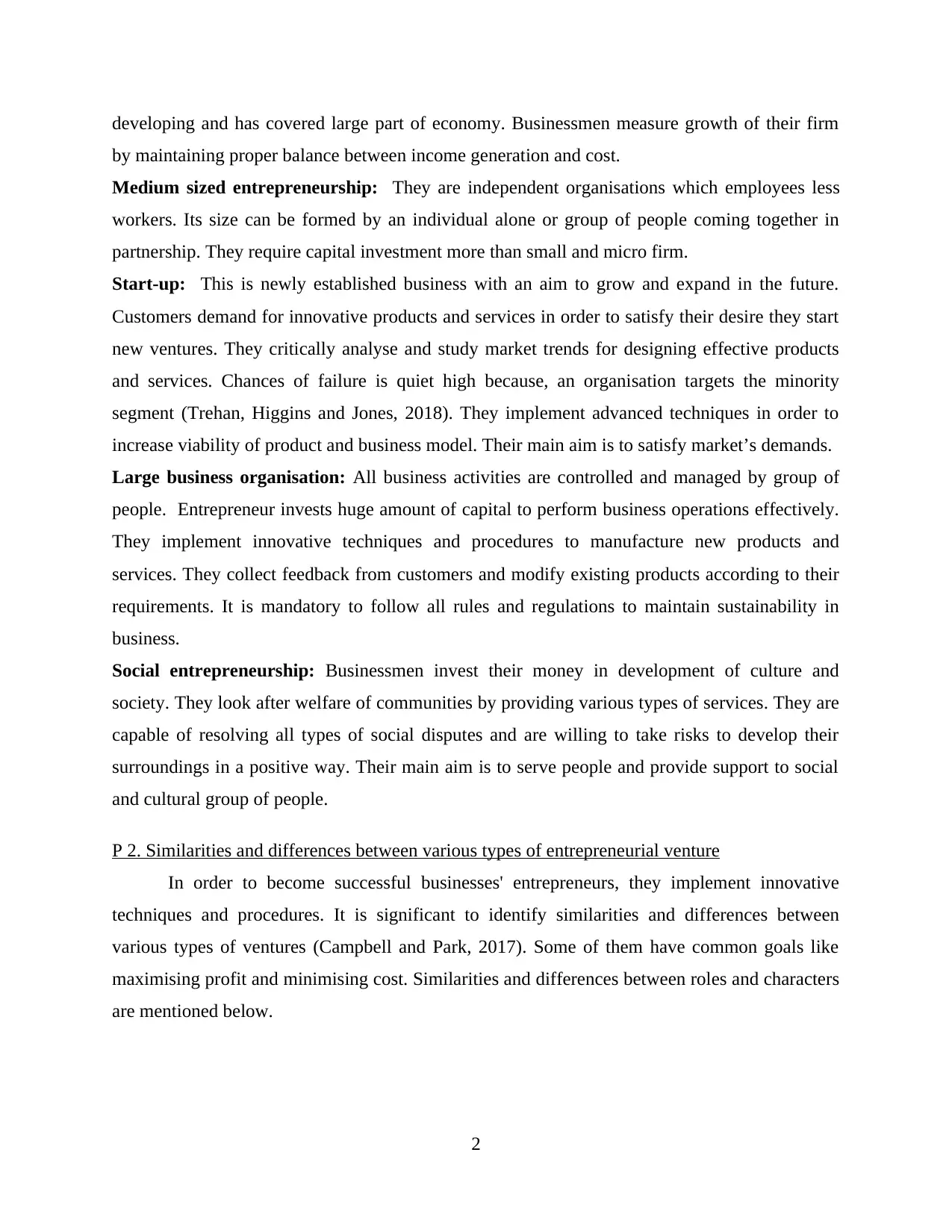
developing and has covered large part of economy. Businessmen measure growth of their firm
by maintaining proper balance between income generation and cost.
Medium sized entrepreneurship: They are independent organisations which employees less
workers. Its size can be formed by an individual alone or group of people coming together in
partnership. They require capital investment more than small and micro firm.
Start-up: This is newly established business with an aim to grow and expand in the future.
Customers demand for innovative products and services in order to satisfy their desire they start
new ventures. They critically analyse and study market trends for designing effective products
and services. Chances of failure is quiet high because, an organisation targets the minority
segment (Trehan, Higgins and Jones, 2018). They implement advanced techniques in order to
increase viability of product and business model. Their main aim is to satisfy market’s demands.
Large business organisation: All business activities are controlled and managed by group of
people. Entrepreneur invests huge amount of capital to perform business operations effectively.
They implement innovative techniques and procedures to manufacture new products and
services. They collect feedback from customers and modify existing products according to their
requirements. It is mandatory to follow all rules and regulations to maintain sustainability in
business.
Social entrepreneurship: Businessmen invest their money in development of culture and
society. They look after welfare of communities by providing various types of services. They are
capable of resolving all types of social disputes and are willing to take risks to develop their
surroundings in a positive way. Their main aim is to serve people and provide support to social
and cultural group of people.
P 2. Similarities and differences between various types of entrepreneurial venture
In order to become successful businesses' entrepreneurs, they implement innovative
techniques and procedures. It is significant to identify similarities and differences between
various types of ventures (Campbell and Park, 2017). Some of them have common goals like
maximising profit and minimising cost. Similarities and differences between roles and characters
are mentioned below.
2
by maintaining proper balance between income generation and cost.
Medium sized entrepreneurship: They are independent organisations which employees less
workers. Its size can be formed by an individual alone or group of people coming together in
partnership. They require capital investment more than small and micro firm.
Start-up: This is newly established business with an aim to grow and expand in the future.
Customers demand for innovative products and services in order to satisfy their desire they start
new ventures. They critically analyse and study market trends for designing effective products
and services. Chances of failure is quiet high because, an organisation targets the minority
segment (Trehan, Higgins and Jones, 2018). They implement advanced techniques in order to
increase viability of product and business model. Their main aim is to satisfy market’s demands.
Large business organisation: All business activities are controlled and managed by group of
people. Entrepreneur invests huge amount of capital to perform business operations effectively.
They implement innovative techniques and procedures to manufacture new products and
services. They collect feedback from customers and modify existing products according to their
requirements. It is mandatory to follow all rules and regulations to maintain sustainability in
business.
Social entrepreneurship: Businessmen invest their money in development of culture and
society. They look after welfare of communities by providing various types of services. They are
capable of resolving all types of social disputes and are willing to take risks to develop their
surroundings in a positive way. Their main aim is to serve people and provide support to social
and cultural group of people.
P 2. Similarities and differences between various types of entrepreneurial venture
In order to become successful businesses' entrepreneurs, they implement innovative
techniques and procedures. It is significant to identify similarities and differences between
various types of ventures (Campbell and Park, 2017). Some of them have common goals like
maximising profit and minimising cost. Similarities and differences between roles and characters
are mentioned below.
2
Paraphrase This Document
Need a fresh take? Get an instant paraphrase of this document with our AI Paraphraser
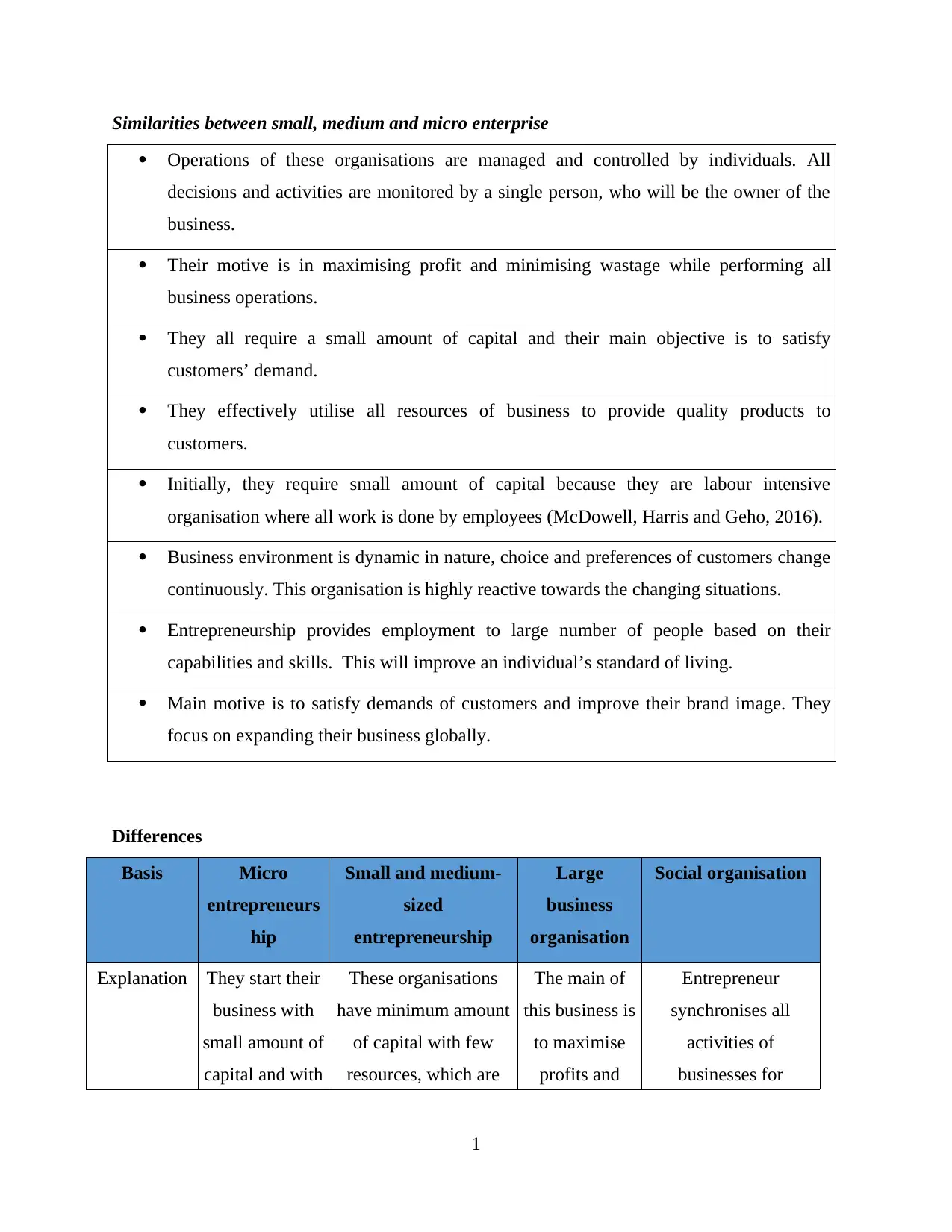
Similarities between small, medium and micro enterprise
Operations of these organisations are managed and controlled by individuals. All
decisions and activities are monitored by a single person, who will be the owner of the
business.
Their motive is in maximising profit and minimising wastage while performing all
business operations.
They all require a small amount of capital and their main objective is to satisfy
customers’ demand.
They effectively utilise all resources of business to provide quality products to
customers.
Initially, they require small amount of capital because they are labour intensive
organisation where all work is done by employees (McDowell, Harris and Geho, 2016).
Business environment is dynamic in nature, choice and preferences of customers change
continuously. This organisation is highly reactive towards the changing situations.
Entrepreneurship provides employment to large number of people based on their
capabilities and skills. This will improve an individual’s standard of living.
Main motive is to satisfy demands of customers and improve their brand image. They
focus on expanding their business globally.
Differences
Basis Micro
entrepreneurs
hip
Small and medium-
sized
entrepreneurship
Large
business
organisation
Social organisation
Explanation They start their
business with
small amount of
capital and with
These organisations
have minimum amount
of capital with few
resources, which are
The main of
this business is
to maximise
profits and
Entrepreneur
synchronises all
activities of
businesses for
1
Operations of these organisations are managed and controlled by individuals. All
decisions and activities are monitored by a single person, who will be the owner of the
business.
Their motive is in maximising profit and minimising wastage while performing all
business operations.
They all require a small amount of capital and their main objective is to satisfy
customers’ demand.
They effectively utilise all resources of business to provide quality products to
customers.
Initially, they require small amount of capital because they are labour intensive
organisation where all work is done by employees (McDowell, Harris and Geho, 2016).
Business environment is dynamic in nature, choice and preferences of customers change
continuously. This organisation is highly reactive towards the changing situations.
Entrepreneurship provides employment to large number of people based on their
capabilities and skills. This will improve an individual’s standard of living.
Main motive is to satisfy demands of customers and improve their brand image. They
focus on expanding their business globally.
Differences
Basis Micro
entrepreneurs
hip
Small and medium-
sized
entrepreneurship
Large
business
organisation
Social organisation
Explanation They start their
business with
small amount of
capital and with
These organisations
have minimum amount
of capital with few
resources, which are
The main of
this business is
to maximise
profits and
Entrepreneur
synchronises all
activities of
businesses for
1
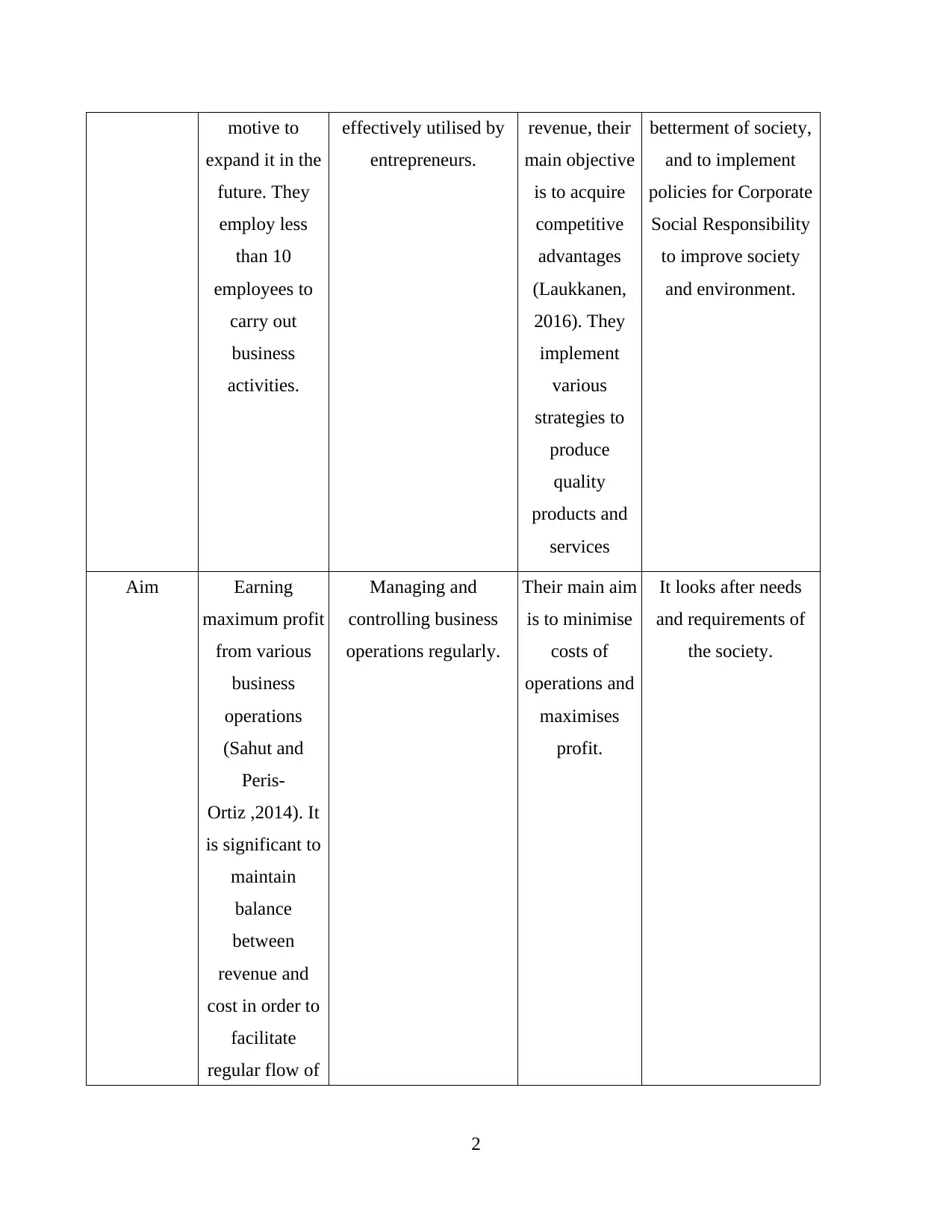
motive to
expand it in the
future. They
employ less
than 10
employees to
carry out
business
activities.
effectively utilised by
entrepreneurs.
revenue, their
main objective
is to acquire
competitive
advantages
(Laukkanen,
2016). They
implement
various
strategies to
produce
quality
products and
services
betterment of society,
and to implement
policies for Corporate
Social Responsibility
to improve society
and environment.
Aim Earning
maximum profit
from various
business
operations
(Sahut and
Peris-
Ortiz ,2014). It
is significant to
maintain
balance
between
revenue and
cost in order to
facilitate
regular flow of
Managing and
controlling business
operations regularly.
Their main aim
is to minimise
costs of
operations and
maximises
profit.
It looks after needs
and requirements of
the society.
2
expand it in the
future. They
employ less
than 10
employees to
carry out
business
activities.
effectively utilised by
entrepreneurs.
revenue, their
main objective
is to acquire
competitive
advantages
(Laukkanen,
2016). They
implement
various
strategies to
produce
quality
products and
services
betterment of society,
and to implement
policies for Corporate
Social Responsibility
to improve society
and environment.
Aim Earning
maximum profit
from various
business
operations
(Sahut and
Peris-
Ortiz ,2014). It
is significant to
maintain
balance
between
revenue and
cost in order to
facilitate
regular flow of
Managing and
controlling business
operations regularly.
Their main aim
is to minimise
costs of
operations and
maximises
profit.
It looks after needs
and requirements of
the society.
2
⊘ This is a preview!⊘
Do you want full access?
Subscribe today to unlock all pages.

Trusted by 1+ million students worldwide
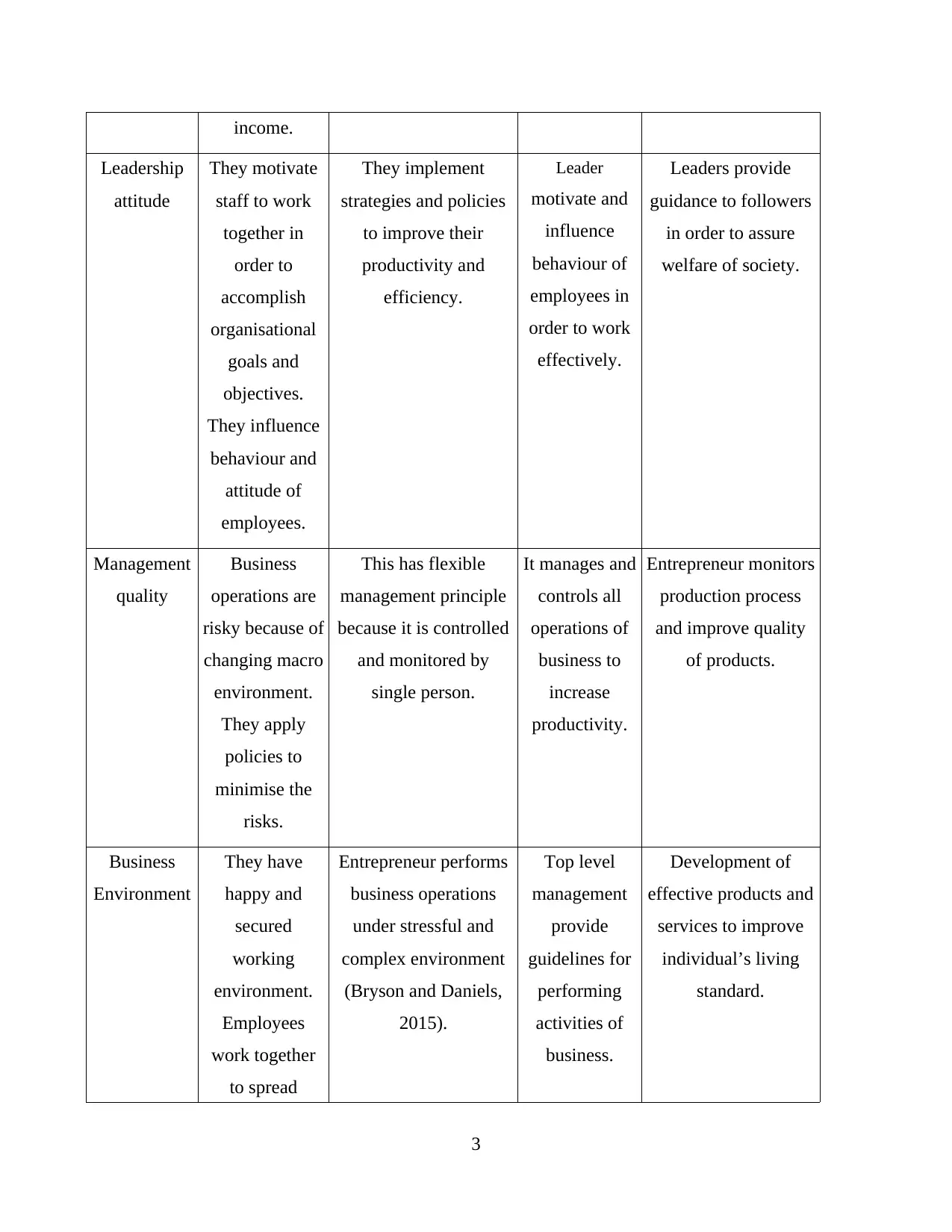
income.
Leadership
attitude
They motivate
staff to work
together in
order to
accomplish
organisational
goals and
objectives.
They influence
behaviour and
attitude of
employees.
They implement
strategies and policies
to improve their
productivity and
efficiency.
Leader
motivate and
influence
behaviour of
employees in
order to work
effectively.
Leaders provide
guidance to followers
in order to assure
welfare of society.
Management
quality
Business
operations are
risky because of
changing macro
environment.
They apply
policies to
minimise the
risks.
This has flexible
management principle
because it is controlled
and monitored by
single person.
It manages and
controls all
operations of
business to
increase
productivity.
Entrepreneur monitors
production process
and improve quality
of products.
Business
Environment
They have
happy and
secured
working
environment.
Employees
work together
to spread
Entrepreneur performs
business operations
under stressful and
complex environment
(Bryson and Daniels,
2015).
Top level
management
provide
guidelines for
performing
activities of
business.
Development of
effective products and
services to improve
individual’s living
standard.
3
Leadership
attitude
They motivate
staff to work
together in
order to
accomplish
organisational
goals and
objectives.
They influence
behaviour and
attitude of
employees.
They implement
strategies and policies
to improve their
productivity and
efficiency.
Leader
motivate and
influence
behaviour of
employees in
order to work
effectively.
Leaders provide
guidance to followers
in order to assure
welfare of society.
Management
quality
Business
operations are
risky because of
changing macro
environment.
They apply
policies to
minimise the
risks.
This has flexible
management principle
because it is controlled
and monitored by
single person.
It manages and
controls all
operations of
business to
increase
productivity.
Entrepreneur monitors
production process
and improve quality
of products.
Business
Environment
They have
happy and
secured
working
environment.
Employees
work together
to spread
Entrepreneur performs
business operations
under stressful and
complex environment
(Bryson and Daniels,
2015).
Top level
management
provide
guidelines for
performing
activities of
business.
Development of
effective products and
services to improve
individual’s living
standard.
3
Paraphrase This Document
Need a fresh take? Get an instant paraphrase of this document with our AI Paraphraser
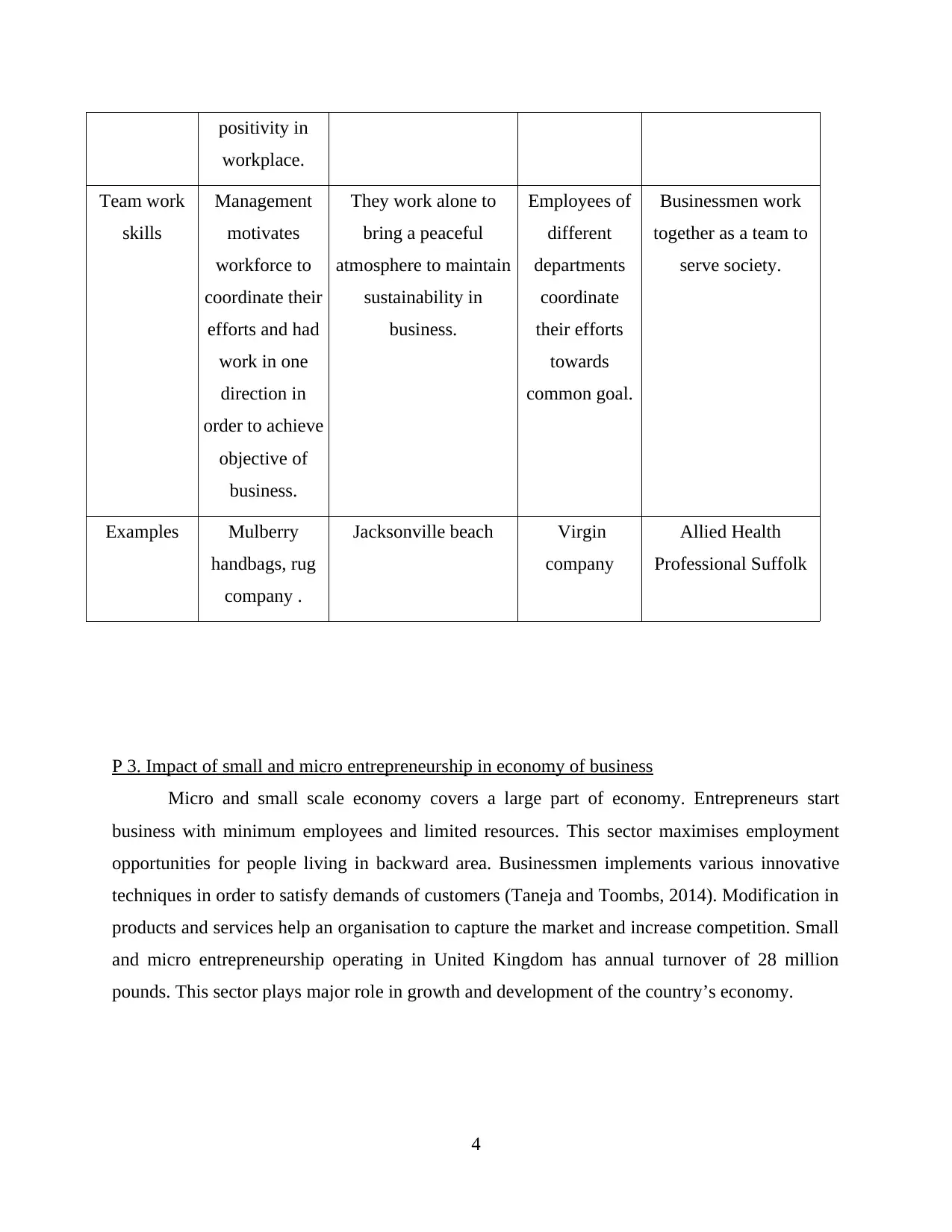
positivity in
workplace.
Team work
skills
Management
motivates
workforce to
coordinate their
efforts and had
work in one
direction in
order to achieve
objective of
business.
They work alone to
bring a peaceful
atmosphere to maintain
sustainability in
business.
Employees of
different
departments
coordinate
their efforts
towards
common goal.
Businessmen work
together as a team to
serve society.
Examples Mulberry
handbags, rug
company .
Jacksonville beach Virgin
company
Allied Health
Professional Suffolk
P 3. Impact of small and micro entrepreneurship in economy of business
Micro and small scale economy covers a large part of economy. Entrepreneurs start
business with minimum employees and limited resources. This sector maximises employment
opportunities for people living in backward area. Businessmen implements various innovative
techniques in order to satisfy demands of customers (Taneja and Toombs, 2014). Modification in
products and services help an organisation to capture the market and increase competition. Small
and micro entrepreneurship operating in United Kingdom has annual turnover of 28 million
pounds. This sector plays major role in growth and development of the country’s economy.
4
workplace.
Team work
skills
Management
motivates
workforce to
coordinate their
efforts and had
work in one
direction in
order to achieve
objective of
business.
They work alone to
bring a peaceful
atmosphere to maintain
sustainability in
business.
Employees of
different
departments
coordinate
their efforts
towards
common goal.
Businessmen work
together as a team to
serve society.
Examples Mulberry
handbags, rug
company .
Jacksonville beach Virgin
company
Allied Health
Professional Suffolk
P 3. Impact of small and micro entrepreneurship in economy of business
Micro and small scale economy covers a large part of economy. Entrepreneurs start
business with minimum employees and limited resources. This sector maximises employment
opportunities for people living in backward area. Businessmen implements various innovative
techniques in order to satisfy demands of customers (Taneja and Toombs, 2014). Modification in
products and services help an organisation to capture the market and increase competition. Small
and micro entrepreneurship operating in United Kingdom has annual turnover of 28 million
pounds. This sector plays major role in growth and development of the country’s economy.
4
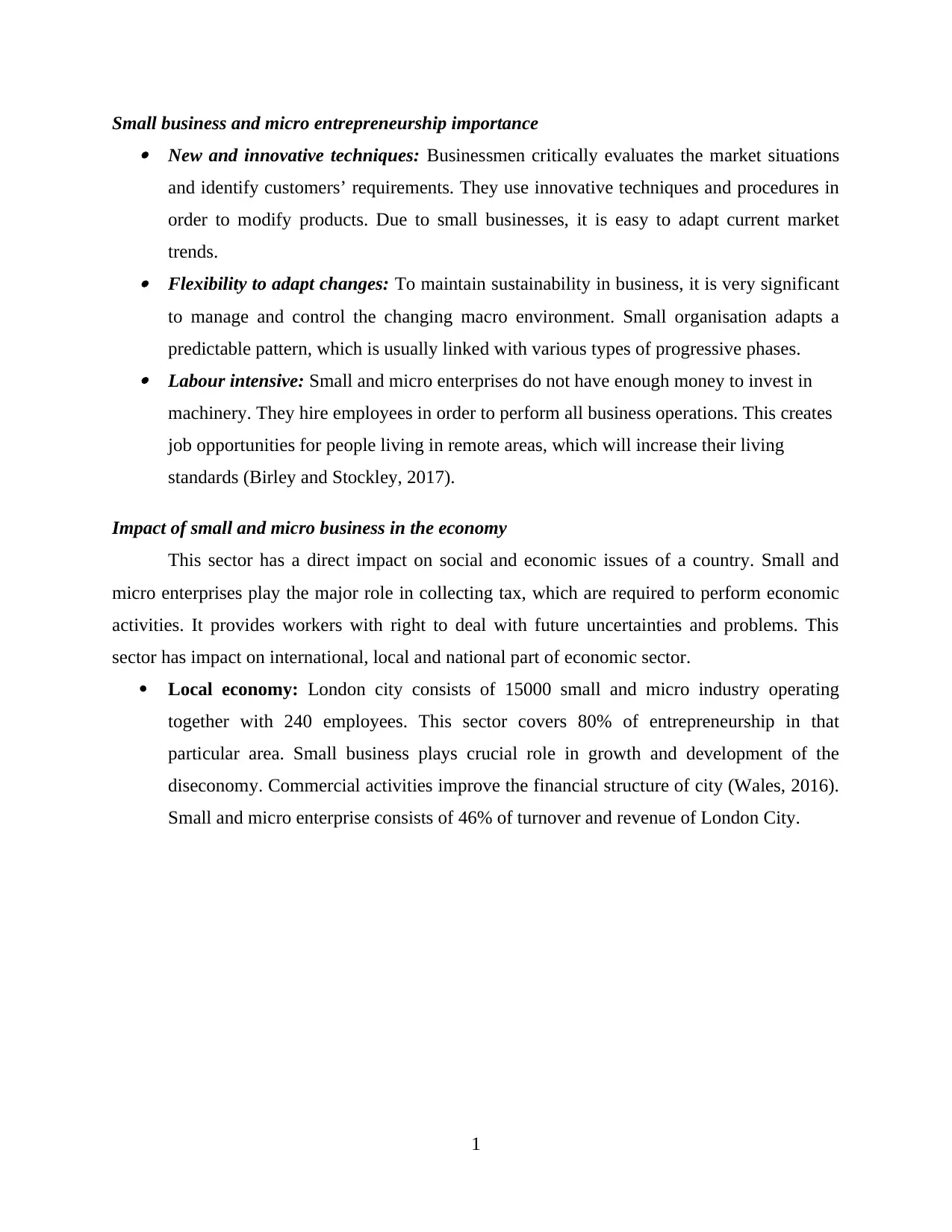
Small business and micro entrepreneurship importance New and innovative techniques: Businessmen critically evaluates the market situations
and identify customers’ requirements. They use innovative techniques and procedures in
order to modify products. Due to small businesses, it is easy to adapt current market
trends. Flexibility to adapt changes: To maintain sustainability in business, it is very significant
to manage and control the changing macro environment. Small organisation adapts a
predictable pattern, which is usually linked with various types of progressive phases. Labour intensive: Small and micro enterprises do not have enough money to invest in
machinery. They hire employees in order to perform all business operations. This creates
job opportunities for people living in remote areas, which will increase their living
standards (Birley and Stockley, 2017).
Impact of small and micro business in the economy
This sector has a direct impact on social and economic issues of a country. Small and
micro enterprises play the major role in collecting tax, which are required to perform economic
activities. It provides workers with right to deal with future uncertainties and problems. This
sector has impact on international, local and national part of economic sector.
Local economy: London city consists of 15000 small and micro industry operating
together with 240 employees. This sector covers 80% of entrepreneurship in that
particular area. Small business plays crucial role in growth and development of the
diseconomy. Commercial activities improve the financial structure of city (Wales, 2016).
Small and micro enterprise consists of 46% of turnover and revenue of London City.
1
and identify customers’ requirements. They use innovative techniques and procedures in
order to modify products. Due to small businesses, it is easy to adapt current market
trends. Flexibility to adapt changes: To maintain sustainability in business, it is very significant
to manage and control the changing macro environment. Small organisation adapts a
predictable pattern, which is usually linked with various types of progressive phases. Labour intensive: Small and micro enterprises do not have enough money to invest in
machinery. They hire employees in order to perform all business operations. This creates
job opportunities for people living in remote areas, which will increase their living
standards (Birley and Stockley, 2017).
Impact of small and micro business in the economy
This sector has a direct impact on social and economic issues of a country. Small and
micro enterprises play the major role in collecting tax, which are required to perform economic
activities. It provides workers with right to deal with future uncertainties and problems. This
sector has impact on international, local and national part of economic sector.
Local economy: London city consists of 15000 small and micro industry operating
together with 240 employees. This sector covers 80% of entrepreneurship in that
particular area. Small business plays crucial role in growth and development of the
diseconomy. Commercial activities improve the financial structure of city (Wales, 2016).
Small and micro enterprise consists of 46% of turnover and revenue of London City.
1
⊘ This is a preview!⊘
Do you want full access?
Subscribe today to unlock all pages.

Trusted by 1+ million students worldwide
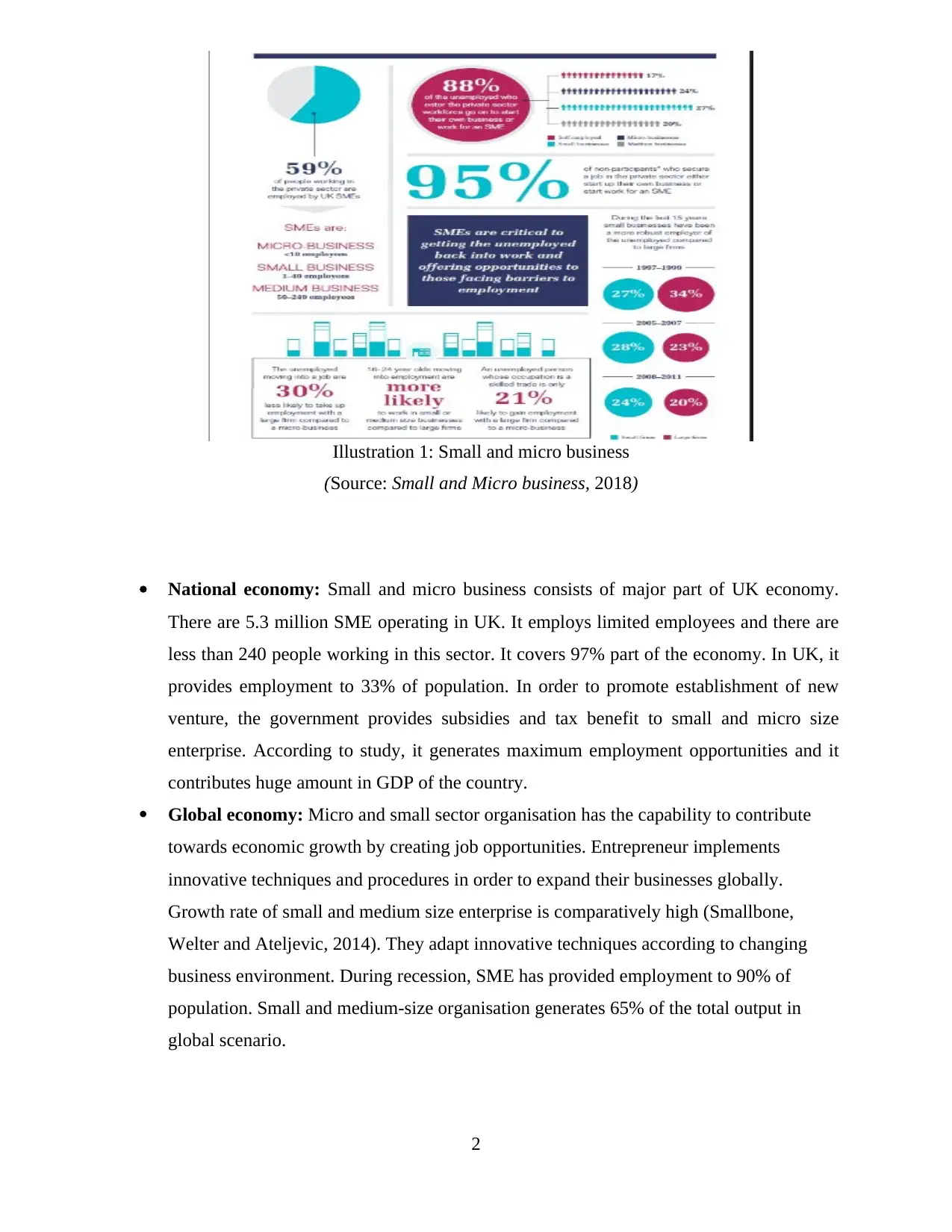
National economy: Small and micro business consists of major part of UK economy.
There are 5.3 million SME operating in UK. It employs limited employees and there are
less than 240 people working in this sector. It covers 97% part of the economy. In UK, it
provides employment to 33% of population. In order to promote establishment of new
venture, the government provides subsidies and tax benefit to small and micro size
enterprise. According to study, it generates maximum employment opportunities and it
contributes huge amount in GDP of the country.
Global economy: Micro and small sector organisation has the capability to contribute
towards economic growth by creating job opportunities. Entrepreneur implements
innovative techniques and procedures in order to expand their businesses globally.
Growth rate of small and medium size enterprise is comparatively high (Smallbone,
Welter and Ateljevic, 2014). They adapt innovative techniques according to changing
business environment. During recession, SME has provided employment to 90% of
population. Small and medium-size organisation generates 65% of the total output in
global scenario.
2
Illustration 1: Small and micro business
(Source: Small and Micro business, 2018)
There are 5.3 million SME operating in UK. It employs limited employees and there are
less than 240 people working in this sector. It covers 97% part of the economy. In UK, it
provides employment to 33% of population. In order to promote establishment of new
venture, the government provides subsidies and tax benefit to small and micro size
enterprise. According to study, it generates maximum employment opportunities and it
contributes huge amount in GDP of the country.
Global economy: Micro and small sector organisation has the capability to contribute
towards economic growth by creating job opportunities. Entrepreneur implements
innovative techniques and procedures in order to expand their businesses globally.
Growth rate of small and medium size enterprise is comparatively high (Smallbone,
Welter and Ateljevic, 2014). They adapt innovative techniques according to changing
business environment. During recession, SME has provided employment to 90% of
population. Small and medium-size organisation generates 65% of the total output in
global scenario.
2
Illustration 1: Small and micro business
(Source: Small and Micro business, 2018)
Paraphrase This Document
Need a fresh take? Get an instant paraphrase of this document with our AI Paraphraser
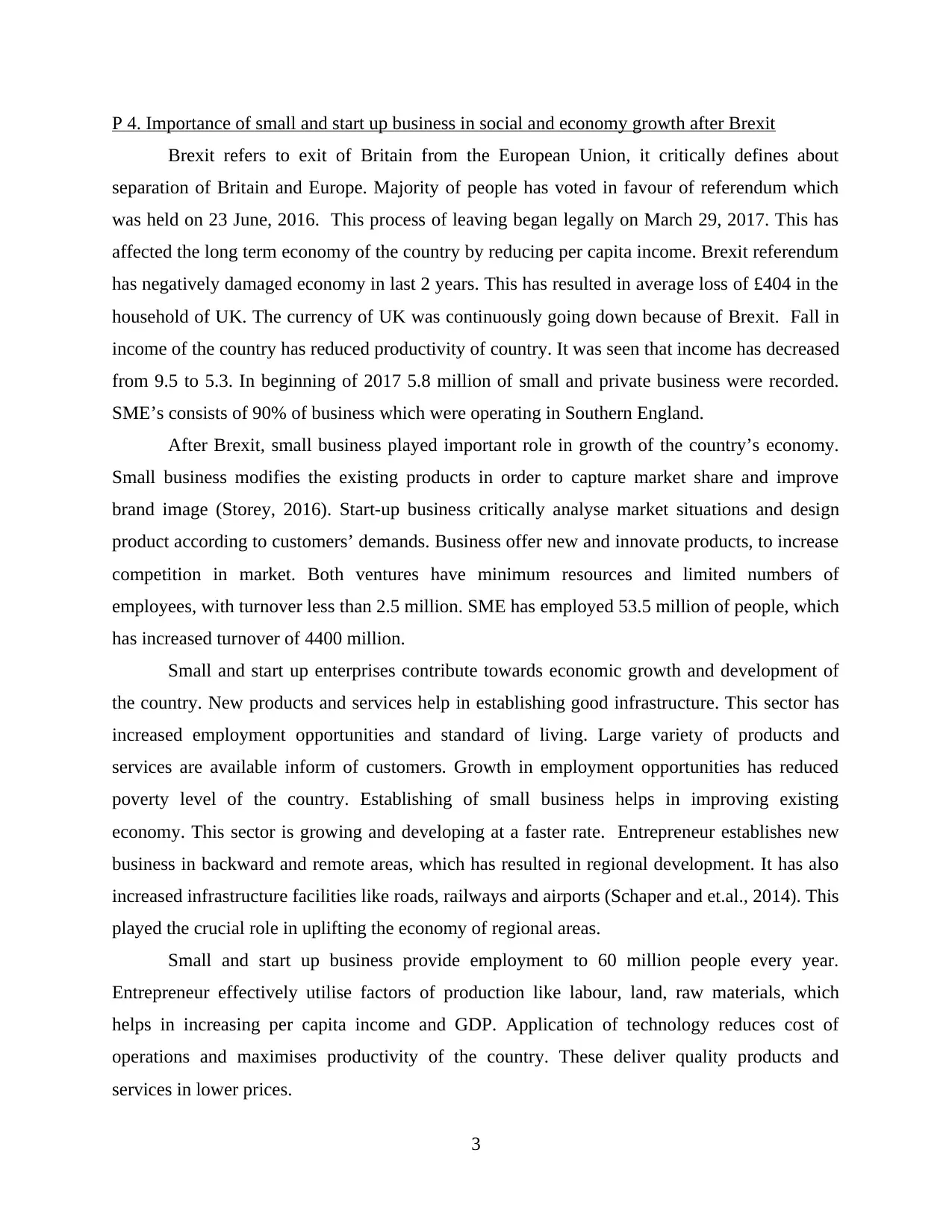
P 4. Importance of small and start up business in social and economy growth after Brexit
Brexit refers to exit of Britain from the European Union, it critically defines about
separation of Britain and Europe. Majority of people has voted in favour of referendum which
was held on 23 June, 2016. This process of leaving began legally on March 29, 2017. This has
affected the long term economy of the country by reducing per capita income. Brexit referendum
has negatively damaged economy in last 2 years. This has resulted in average loss of £404 in the
household of UK. The currency of UK was continuously going down because of Brexit. Fall in
income of the country has reduced productivity of country. It was seen that income has decreased
from 9.5 to 5.3. In beginning of 2017 5.8 million of small and private business were recorded.
SME’s consists of 90% of business which were operating in Southern England.
After Brexit, small business played important role in growth of the country’s economy.
Small business modifies the existing products in order to capture market share and improve
brand image (Storey, 2016). Start-up business critically analyse market situations and design
product according to customers’ demands. Business offer new and innovate products, to increase
competition in market. Both ventures have minimum resources and limited numbers of
employees, with turnover less than 2.5 million. SME has employed 53.5 million of people, which
has increased turnover of 4400 million.
Small and start up enterprises contribute towards economic growth and development of
the country. New products and services help in establishing good infrastructure. This sector has
increased employment opportunities and standard of living. Large variety of products and
services are available inform of customers. Growth in employment opportunities has reduced
poverty level of the country. Establishing of small business helps in improving existing
economy. This sector is growing and developing at a faster rate. Entrepreneur establishes new
business in backward and remote areas, which has resulted in regional development. It has also
increased infrastructure facilities like roads, railways and airports (Schaper and et.al., 2014). This
played the crucial role in uplifting the economy of regional areas.
Small and start up business provide employment to 60 million people every year.
Entrepreneur effectively utilise factors of production like labour, land, raw materials, which
helps in increasing per capita income and GDP. Application of technology reduces cost of
operations and maximises productivity of the country. These deliver quality products and
services in lower prices.
3
Brexit refers to exit of Britain from the European Union, it critically defines about
separation of Britain and Europe. Majority of people has voted in favour of referendum which
was held on 23 June, 2016. This process of leaving began legally on March 29, 2017. This has
affected the long term economy of the country by reducing per capita income. Brexit referendum
has negatively damaged economy in last 2 years. This has resulted in average loss of £404 in the
household of UK. The currency of UK was continuously going down because of Brexit. Fall in
income of the country has reduced productivity of country. It was seen that income has decreased
from 9.5 to 5.3. In beginning of 2017 5.8 million of small and private business were recorded.
SME’s consists of 90% of business which were operating in Southern England.
After Brexit, small business played important role in growth of the country’s economy.
Small business modifies the existing products in order to capture market share and improve
brand image (Storey, 2016). Start-up business critically analyse market situations and design
product according to customers’ demands. Business offer new and innovate products, to increase
competition in market. Both ventures have minimum resources and limited numbers of
employees, with turnover less than 2.5 million. SME has employed 53.5 million of people, which
has increased turnover of 4400 million.
Small and start up enterprises contribute towards economic growth and development of
the country. New products and services help in establishing good infrastructure. This sector has
increased employment opportunities and standard of living. Large variety of products and
services are available inform of customers. Growth in employment opportunities has reduced
poverty level of the country. Establishing of small business helps in improving existing
economy. This sector is growing and developing at a faster rate. Entrepreneur establishes new
business in backward and remote areas, which has resulted in regional development. It has also
increased infrastructure facilities like roads, railways and airports (Schaper and et.al., 2014). This
played the crucial role in uplifting the economy of regional areas.
Small and start up business provide employment to 60 million people every year.
Entrepreneur effectively utilise factors of production like labour, land, raw materials, which
helps in increasing per capita income and GDP. Application of technology reduces cost of
operations and maximises productivity of the country. These deliver quality products and
services in lower prices.
3
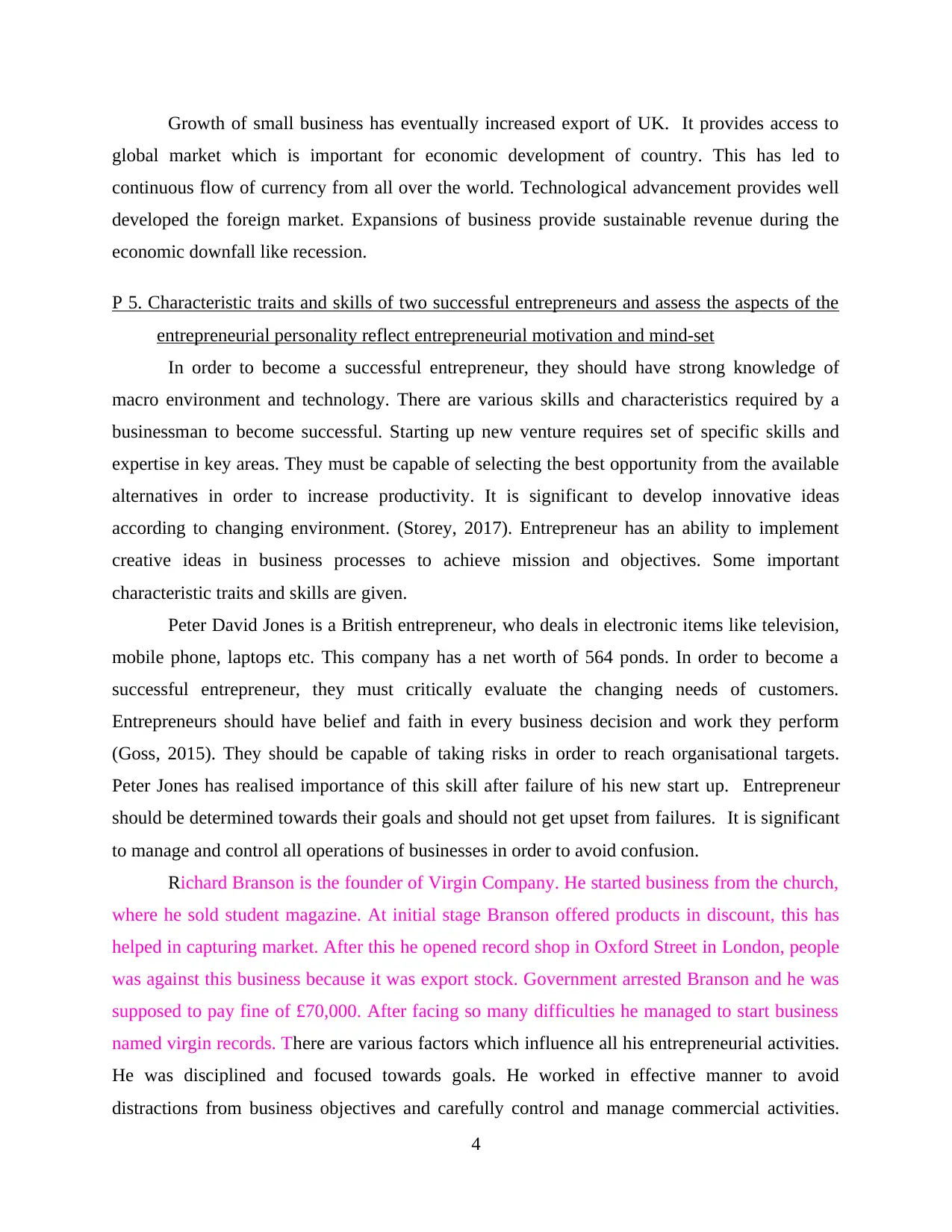
Growth of small business has eventually increased export of UK. It provides access to
global market which is important for economic development of country. This has led to
continuous flow of currency from all over the world. Technological advancement provides well
developed the foreign market. Expansions of business provide sustainable revenue during the
economic downfall like recession.
P 5. Characteristic traits and skills of two successful entrepreneurs and assess the aspects of the
entrepreneurial personality reflect entrepreneurial motivation and mind-set
In order to become a successful entrepreneur, they should have strong knowledge of
macro environment and technology. There are various skills and characteristics required by a
businessman to become successful. Starting up new venture requires set of specific skills and
expertise in key areas. They must be capable of selecting the best opportunity from the available
alternatives in order to increase productivity. It is significant to develop innovative ideas
according to changing environment. (Storey, 2017). Entrepreneur has an ability to implement
creative ideas in business processes to achieve mission and objectives. Some important
characteristic traits and skills are given.
Peter David Jones is a British entrepreneur, who deals in electronic items like television,
mobile phone, laptops etc. This company has a net worth of 564 ponds. In order to become a
successful entrepreneur, they must critically evaluate the changing needs of customers.
Entrepreneurs should have belief and faith in every business decision and work they perform
(Goss, 2015). They should be capable of taking risks in order to reach organisational targets.
Peter Jones has realised importance of this skill after failure of his new start up. Entrepreneur
should be determined towards their goals and should not get upset from failures. It is significant
to manage and control all operations of businesses in order to avoid confusion.
Richard Branson is the founder of Virgin Company. He started business from the church,
where he sold student magazine. At initial stage Branson offered products in discount, this has
helped in capturing market. After this he opened record shop in Oxford Street in London, people
was against this business because it was export stock. Government arrested Branson and he was
supposed to pay fine of £70,000. After facing so many difficulties he managed to start business
named virgin records. There are various factors which influence all his entrepreneurial activities.
He was disciplined and focused towards goals. He worked in effective manner to avoid
distractions from business objectives and carefully control and manage commercial activities.
4
global market which is important for economic development of country. This has led to
continuous flow of currency from all over the world. Technological advancement provides well
developed the foreign market. Expansions of business provide sustainable revenue during the
economic downfall like recession.
P 5. Characteristic traits and skills of two successful entrepreneurs and assess the aspects of the
entrepreneurial personality reflect entrepreneurial motivation and mind-set
In order to become a successful entrepreneur, they should have strong knowledge of
macro environment and technology. There are various skills and characteristics required by a
businessman to become successful. Starting up new venture requires set of specific skills and
expertise in key areas. They must be capable of selecting the best opportunity from the available
alternatives in order to increase productivity. It is significant to develop innovative ideas
according to changing environment. (Storey, 2017). Entrepreneur has an ability to implement
creative ideas in business processes to achieve mission and objectives. Some important
characteristic traits and skills are given.
Peter David Jones is a British entrepreneur, who deals in electronic items like television,
mobile phone, laptops etc. This company has a net worth of 564 ponds. In order to become a
successful entrepreneur, they must critically evaluate the changing needs of customers.
Entrepreneurs should have belief and faith in every business decision and work they perform
(Goss, 2015). They should be capable of taking risks in order to reach organisational targets.
Peter Jones has realised importance of this skill after failure of his new start up. Entrepreneur
should be determined towards their goals and should not get upset from failures. It is significant
to manage and control all operations of businesses in order to avoid confusion.
Richard Branson is the founder of Virgin Company. He started business from the church,
where he sold student magazine. At initial stage Branson offered products in discount, this has
helped in capturing market. After this he opened record shop in Oxford Street in London, people
was against this business because it was export stock. Government arrested Branson and he was
supposed to pay fine of £70,000. After facing so many difficulties he managed to start business
named virgin records. There are various factors which influence all his entrepreneurial activities.
He was disciplined and focused towards goals. He worked in effective manner to avoid
distractions from business objectives and carefully control and manage commercial activities.
4
⊘ This is a preview!⊘
Do you want full access?
Subscribe today to unlock all pages.

Trusted by 1+ million students worldwide
1 out of 19
Related Documents
Your All-in-One AI-Powered Toolkit for Academic Success.
+13062052269
info@desklib.com
Available 24*7 on WhatsApp / Email
![[object Object]](/_next/static/media/star-bottom.7253800d.svg)
Unlock your academic potential
Copyright © 2020–2026 A2Z Services. All Rights Reserved. Developed and managed by ZUCOL.





